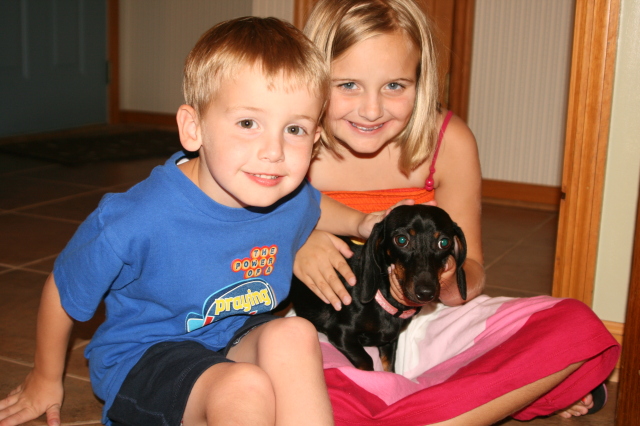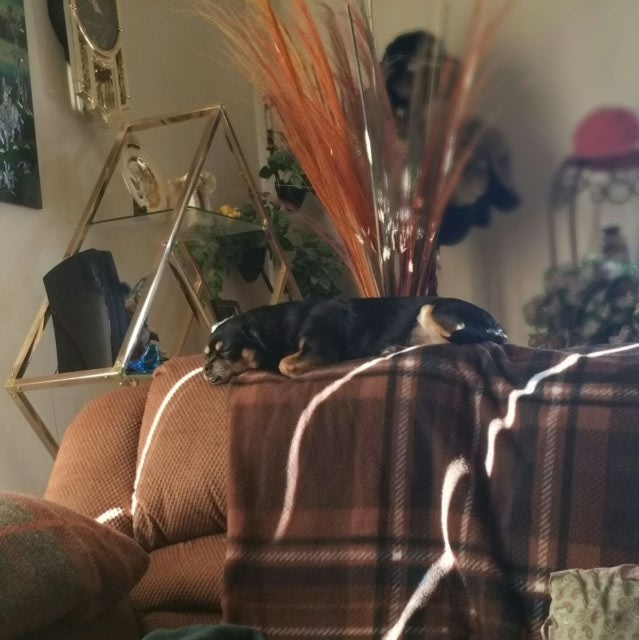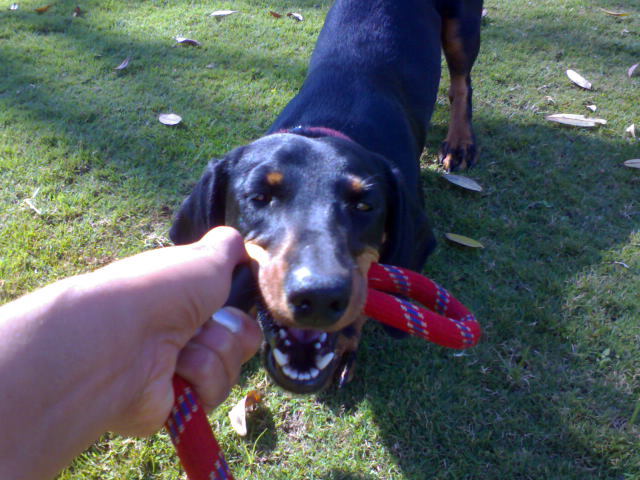Questionneed free help dog ruptured cranial ligament in both legs.I took my dog to vet first because she was limping on one leg.First visit did x-ray's said she did not have any broken bones or arthiritis.She probably pulled something and gave remadryl in about a week she was better.Then I let her in morning went to get her she couldn't get up. Took her back to vet they took some blood checked for lyme disease she didn't have gave me antibiotic,prednisone and tramadol.Said she should up and walking by next day or definitely all better in two day's.Took her back in two days she wasn't doing any better.The vet had the owner of vet office come in he looked her over and said it was ruptured cranial ligament in both legs. They took her off antibiotics rearranged her predizone schedule and kept her on pain meds.The vet said it cost a lot for surgery and her having both legs involved it would be costly.He said I could wait and let sacred tissue build up around the knees and it would heal.It would take a long time and she will have arthritis. Do you know of any low cost place's or any holistic remedy's I could use. She is currently taking remadryl,tramadol and glusomine.I live in Maryland and I'm trying to find some help for her.Maggie my dog is eight years old.Any help would be greatly appreciated thank you.
Sincerely, Denise Anderson
AnswerHi Denise,
Surgery, though costly is the only corrective measure for cranial cruciate ligament injuries. Surgery will stabilize the knee, allowing it to regain normal motion and thereby reducing the formation of arthritis. If surgery is not performed, progressive arthritis will occur and the lameness will worsen with time.
Conservative treatment (weight control, rest, medication) is often combined with surgery, but it can be used alone for dogs that weigh less than 25 pounds. However, surgery is recommended for all dogs. It speeds recovery, minimized degenerative changes, and enhances function.
If you opt for just rest and pain medication alone, healing may take 3 months or longer.
I understand that the financial aspect has to be considered, but there isn't such a thing as low cost surgery. You could contact your local humane society, many times they know of low cost vet clinics in their area, but I don't know if they offer lower cost surgery as well. You could ask your vet if she would allow you to pay off the surgery bill over time. Many vets are agreeable to this, especially if your dog has been a patient for a number of years. There is also special credit you can apply for that's specifically for paying off medical bills (both veterinary and human medical purposes). You can read more about CareCredit here: http://www.carecredit.com/
Holistic remedies, or "Nutraceuticals" are best used at the onset of a condition, such as arthritis, to help slow the progression of the disease. They are not a cure, and they do not work in every dog. These remedies must be given daily for the rest of the dog's life. If they are discontinued, the joint deterioration will resume.
A glucosamine supplement is what'd recommend, and you're already using one. Keep in mind, your dog must be on glucosamine for at least a month (sometimes longer) before you can expect to see results. You can add chondroitin sulfate as a daily supplement along with the glucosamine. You shouldn't have a problem finding one supplement that contains both. Chondroitin sulfate blocks enzymes that break down cartilage, and glucosamine builds cartilage and may also decrease inflammation.
Methyl-sulfonyl-methane (MSM) is a natural, sulfur-containing compound produced by kelp in the ocean. MSM is reported to enhance the structural integrity of connective tissue, and help reduce scar tissue by altering cross-linkages which contribute to scar formation. You can find this item in in drug stores and health food stores. Ask your vet for the correct dose.
Adequan is an injectable form of Glucosamine that helps prevent the breakdown of cartilage and may help with the synthesis of new cartilage. Ask your vet about this treatment.
A veterinary acupuncturist might help too, though surgery is the treatment of choice for this condition. Acupuncture is an alternative medical therapy that helps to relieve arthritis pain, it won't correct the ligaments.
Acupuncture can be used in conjunction with other forms of treatment, including anti-inflammatory medication. Several weekly treatments are usually needed before clinical improvement is seen. Ask your veterinarian to recommend a veterinary acupuncturist in your area. You can also locate one in your area here:
http://www.ivas.org/member_search.cfm
http://www.aava.org/pub/directory_links_public.html
It's important to keep your dog confined as much as possible to let the healing take place, and continue using the pain medication.
I once had an elderly dog that ruptured ligament, so surgery was not a good option. He did recover in time, so I know how hard it is to manage a dog with this condition. Especially in the beginning, it's hard to see your dog in so much pain.
I hope I've been a help.
Best of luck,
Patti

 1 year old daschund
Question
our new member
We recently got a one year old
1 year old daschund
Question
our new member
We recently got a one year old
 Dog Breed.
Question
Recent photo this week
Hello,
I saw that you
Dog Breed.
Question
Recent photo this week
Hello,
I saw that you
 What breed is my dog?
Question
Sugar Sugar
I got my dog from an
What breed is my dog?
Question
Sugar Sugar
I got my dog from an
 Eye problems w/ schnauzers
Question
Mini parti schnauzer
We currently have a 14 yr
Eye problems w/ schnauzers
Question
Mini parti schnauzer
We currently have a 14 yr
 Dog unwilling to eat
Question
Maggie
I have a 4 year old daschund female.She
Dog unwilling to eat
Question
Maggie
I have a 4 year old daschund female.She